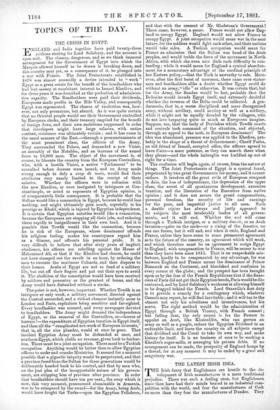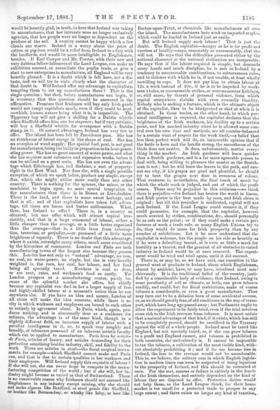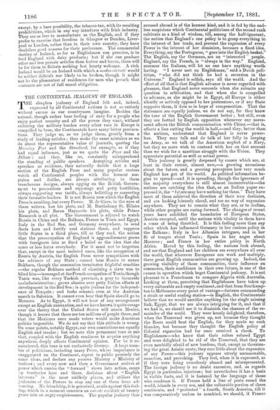• THE LATEST IRISH IDEA.
THE Irish fancy that Englishmen are hostile to the de- velopment of Irish manufactures is a mere traditional prejudice. There was such a feeling once, but Englishmen since then have had their minds braced in an industrial com- petition with the world, and fear the manufactures of Cork no more than they fear the manufactures of Dundee. They would be heartily glad, in truth, to hear that Ireland was taking to manufactures, that her interests were no longer exclusively agrarian, that her people were no longer so dependent on the produce of the soil. A country cannot be happy which a few clouds can starve. Ireland in a worry about the price of cotton or pig-iron would be a relief from Ireland in a fury with the landlords, and would be more intelligible to Englishmen, besides. If Earl Cowper and Mr. Forster, with their new and very dubious fellow-labourers of the Land League, can make an exhibition succeed, or resuscitate the poplin trade, or give a start to new enterprises in manufacture, all England will be very heartily pleased. It is a doubt which is felt here, not a dis- taste, and we will try to state clearly what the character of that doubt is. Will Ireland offer any advantage to capitalists, tempting them to set up manufactures there ? That is the single question ; but then, before manufactures can begin, it is necessary that this question should be answered in the affirmative. Promises that Irishmen will buy only Irish goods would not tempt capitalists much, even if they could be kept, —which, human nature being what it is, is impossible. The Tipperary boy will not give a shilling for a Dublin whittle when Sheffield offers him one for sixpence; but if very patriotic, will buy a Sheffield whittle for sevenpence with a Dublin stamp on it. Of natural advantages, Ireland has very few to offer. The island has been left by Providence poor. She has no storehouse of latent energy in the shape of coal. She has no overplus of wood supply. Her special fuel, peat, is not good for manufactures, being too bulky in proportion to its heat-gener- .ating power. She has no great amount of water-power, and what she has requires most extensive and expensive works, before it oan be utilised on a great scale. She has not even the advan- iag,e which Edinburgh has, and disdains, a sort of property- Tight in the East Wind. Nor does she, with a single possible exception, of which we speak below, produce any staple, except .flax, which she might utilise more easily than any other country. There is nothing for the spinner, the miner, or the machinist to begin upon, no more special temptation to the manufacturer than there is in Dorset or Lincolnshire. There is the land, and there is some sweet herbage, and that is all ; and of that capitalists have taken full advan- tage, till there are bacon and butter millionaires. What, then, has Ireland to offer ? There is, in a country so situated, but one offer which will attract capital irre- sistibly, and that is a large command of labour, either a -little cheaper than the average, or a little better organised -than the average—that is, a little freer from interrup- lion, terrorism, or prejudice,—or possessed of a little more -brightness of capacity. There is no doubt that this advantage, -where it exists, outweighs many others, much more considered by the historians of commerce. London and Paris are both manufacturing towns of the largest size because they possess :this. London has not only no " natural " advantage, no iron, aro coal, no water-power, no staple, but she is very heavily weighted in the race, her coal, her labour, and her food
being all specially taxed. Nowhere is coal so dear, -or are rent, rates, and workmen's food so costly. Yet
London prospers as a manufacturing centre, partly be- oause of the splendid market she offers, but chiefly because any capitalist can find in her a larger supply of free and highly-skilled labour at a moment's notice than he can anywhere else. If you have an idea and money, London of all cities will make the idea concrete, while there is no -city in which workmen and employers are bound to each other so entirely by agreement alone. In Paris, which, again, pro- Kluces nothing, and is abnormally dear as a residence for artisans, the advantage is of the same kind, though in a slightly different field, an immense supply of labour with a peculiar intelligence in it, or, to speak very roughly and broadly, of labourers possessed of an inherent artistic faculty which can be applied to manufacture. Paris lives by articles de Paris, articles of luxury, and articles demanding for their perfection something besides industry, skill, and fidelity to the work. There are articles in steel—the finest surgical instru- ments, for example—which Sheffield cannot make and Paris oan, and that is due to certain qualities in her workmen and their employers. Will Ireland supply this requisite of labour ? If she will not, she can never hope to compete in the manu- facturing competition of the world ; but if she will, her in- -dustry might become as varied as that of Switzerland. There is no conceivable reason why Irishmen should not succeed like Englishmen in any industry except mining, why she should not make alpacas like Bradford, or steel goods like Sheffield, or leather like Bermondsey, or whisky like Islay, or beer like
Burton-upon-Trent, or chemicals like manufacturers all over the island. The manufacturers here work on imported staples, which could be landed in Ireland just as easily.
But will Ireland supply such labour ? That is just the doubt. The English capitalist—hungry as he is for profit and careless of locality—says, reasonably or unreasonably, that she will not. He says that the difficulties presented either by the national character or the national civilisation are insuperable. He says that if the labour required is simple, but demands many hands and much discipline, he is met in Ireland by a. tendency to unreasonable combinations, to subterranean rules, and to violence with which he is, if not unable, at least wholly unwilling to cope. It does not pay him to obtain labour at 12s. a week instead of 20s., if he is to be impeded by work- men's rules, or unreasonable strikes, or over-numerous holidays, or, still more, by threats of personal violence, from which capital everywhere shrinks with even cowardly timidity. Nobody who is seeking a fortune, which is the ultimate object of the capitalist, likes to be bludgeoned or shot at when it is obtained. In those trades, on the other hand, in which per- sonal intelligence is required, the capitalist declares that the brightness of the Irish workman, his docility up to a certain point, and his marked industry when he is allowed some con- trol over his own time and methods, are all counter-balanced by a certain want of respect for the work itself,—a belief that less than perfect work will do, an immovable opinion that if the knife is keen and the handle strong, the smoothness of the blade does not matter. It does, unfortunately, matter every- thing in the market. An Irish gardener will learn quicker than a Scotch gardener, and is a far more agreeable person to deal with, being willing to pleasure the master as the Scotch- man is not ; but he will leave the leaves in the path, and can- not see why, if his grapes are good and plentiful, he shonld try to beat the grapes next door in evenness of colour. That evenness is, nevertheless, the final touch of merit by which the whole work is judged, and out of which the profit comes. There may be prejudice in this criticism—we think there is prejudice—for Ireland has beaten the world in linens, and Irish porter is the best made by man, and Irish china is original ; but till this prejudice is eradicated, capital will not seek Ireland. If the Land League could remove it, if they could guarantee, for example, that the capitalist, however much worried by strikes, combinations, &c., should personally be as safe as the priest ; or if they could make a certain per- fectness of work a trade rule, as many English Unions try to do, they would do more for Irish prosperity than by any number of exhibitions. Let it be once understood that the capitalist is welcome, has the people on his side as heartily as if he were a defaulting tenant, or is even as little a mark for hostility as a tourist, and the greatest of all obstacles to varied industry in Ireland would be at once removed. The experi- ment would be tried and tried again, until it did succeed.
There is, or may be, as we have said, one exception to the general want of products in Ireland, about which Englishmen, almost by accident, have, or may have, interfered most mis-- chievously. It is the traditional belief of the country, justi- fied by a considerable body of evidence, that Ireland, owing to some peculiarity of soil or climate, or both, can grow tobacco readily, and could, but for fiscal restrictions, make of coarse tobacco a considerable, or even a great manufacture. That may turn out to be a delusion born of some accidental success, or, as we should greatly fear, of old conditions in the way of trans- port, which have long ago passed away; but Parliament ought to allow the experiment to be fairly tried, even if the trial involves some risk to the Irish revenue from tobacco. It is most unfair that a natural advantage of that kind, if it exists, which has still to be completely proved, should be sacrificed to the Treasury against the will of a whole people. Ireland must be taxed like
England, but not specially taxed, as, if she can grow tobacco to a profit and England cannot, and tobacco is prohibited in both countries, she undoubtedly is. It cannot be impossible
to tax the tobacco, a cultivation of the most visible kind, with- out absolutely prohibiting it ; and if its use became free in
Ireland, the loss to the revenue would not be unendurable. This is, we believe, the solitary case in which English legisla- tion in modern times can even be suspected of being injurious to the prosperity of Ireland, and this should be corrected at once. For the rest, success or failure is entirely in the hands of the Irish themselves, and entirely dependent on the kind of labour they are disposed to offer. Protective duties would not help them, as the Land League think, for their home market is too small for a protected trade to prosper to any large extent ; and there exists no longer any kind of taxation,. except. by a bare possibility, the tobacco-tax, with its resulting prohibitions, which in any way interferes with Irish industry. They are as free to manufacture as the English, and if they prefer to exercise that freedom in Glasgow or Dundee, Liver- pool or London, rather than in their own country, they have doubtless good reasons for their preference. The commercial destiny of Ireland, so far as Englishmen can perceive, is to feed England with dairy products; but if she can produce other and less prosaic articles than butter and bacon, there will be for them in Britain nothing but hearty welcome. A rich Ireland would be an Ireland with which a modus riven di would be neither difficult nor likely to be broken, though it might not ba the pleasantest of residences for men who preach that contracts are not of full moral obligation.
































 Previous page
Previous page